Deck 14: Exponential and Logarithmic Functions
Question
Question
Question
Question
Question
Question
Question
Question
Question
Question
Question
Question
Question
Question
Question
Question
Question
Question
Question
Question
Question
Question
Question
Question
Question
Question
Question
Question
Question
Question
Question
Question
Question
Question
Question
Question
Question
Question
Question
Question
Question
Question
Question
Question
Question
Question
Question
Question
Question
Question
Question
Question
Question
Question
Question
Question
Question
Question
Question
Question
Question
Question
Question
Question
Question
Question
Question
Question
Question
Question
Question
Question
Question
Question
Question
Question
Question
Question
Question
Question

Unlock Deck
Sign up to unlock the cards in this deck!
Unlock Deck
Unlock Deck
1/228
Play
Full screen (f)
Deck 14: Exponential and Logarithmic Functions
1
Solve the equation.
A)
B)
C)
D)
A)
B)
C)
D)
2
An equation of the form is a one-to-one function.
True
3
Solve the equation.
A) x = 3
B) x = 3
C) x = 1
D) x = 2
E) x = 1
A) x = 3
B) x = 3
C) x = 1
D) x = 2
E) x = 1
x = 1
4
Solve the equation.
A) x = 8
B) x = 6
C) x = 6
D) x = 7
E) x = 8
A) x = 8
B) x = 6
C) x = 6
D) x = 7
E) x = 8

Unlock Deck
Unlock for access to all 228 flashcards in this deck.
Unlock Deck
k this deck
5
The graphs of and are reflections of each other across the x axis.

Unlock Deck
Unlock for access to all 228 flashcards in this deck.
Unlock Deck
k this deck
6
If and , then the function f defined by where x is any real number, is called the power function with base b .

Unlock Deck
Unlock for access to all 228 flashcards in this deck.
Unlock Deck
k this deck
7
Solve the equation.
A) x = 2
B) x = 2
C) x = 4
D) x = 4
E) x = 3
A) x = 2
B) x = 2
C) x = 4
D) x = 4
E) x = 3

Unlock Deck
Unlock for access to all 228 flashcards in this deck.
Unlock Deck
k this deck
8
All graphs of contain the point .

Unlock Deck
Unlock for access to all 228 flashcards in this deck.
Unlock Deck
k this deck
9
Solve the equation.
A)
B)
C)
D)
A)
B)
C)
D)

Unlock Deck
Unlock for access to all 228 flashcards in this deck.
Unlock Deck
k this deck
10
Solve the equation.
A)
B)
C)
D)
A)
B)
C)
D)

Unlock Deck
Unlock for access to all 228 flashcards in this deck.
Unlock Deck
k this deck
11
Solve the equation.
A)
B)
C)
D)
A)
B)
C)
D)

Unlock Deck
Unlock for access to all 228 flashcards in this deck.
Unlock Deck
k this deck
12
Graph the exponential function.
A)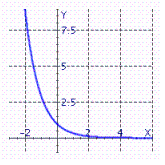
B)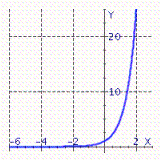
C)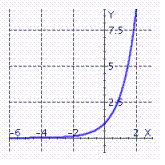
A)

B)

C)


Unlock Deck
Unlock for access to all 228 flashcards in this deck.
Unlock Deck
k this deck
13
Solve the equation.
A) x = 2
B) x = 0
C) x = 1
D) x = 2
A) x = 2
B) x = 0
C) x = 1
D) x = 2

Unlock Deck
Unlock for access to all 228 flashcards in this deck.
Unlock Deck
k this deck
14
Solve the equation.
A) x = 1
B) x = 1
C) x = 3
D) x = 3
E) x = 2
A) x = 1
B) x = 1
C) x = 3
D) x = 3
E) x = 2

Unlock Deck
Unlock for access to all 228 flashcards in this deck.
Unlock Deck
k this deck
15
Solve the equation.
A) x = 3
B) x = 4
C) x = 3
D) x = 5
E) x = 5
A) x = 3
B) x = 4
C) x = 3
D) x = 5
E) x = 5

Unlock Deck
Unlock for access to all 228 flashcards in this deck.
Unlock Deck
k this deck
16
Graph the exponential function.
A)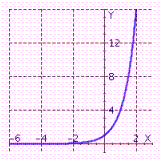
B)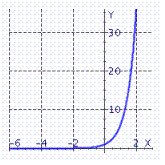
C)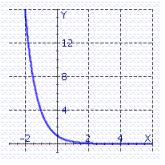
A)

B)

C)


Unlock Deck
Unlock for access to all 228 flashcards in this deck.
Unlock Deck
k this deck
17
Solve the equation.
A) x = 2
B) x = 4
C) x = 1
D) x = 3
E) x = 1
A) x = 2
B) x = 4
C) x = 1
D) x = 3
E) x = 1

Unlock Deck
Unlock for access to all 228 flashcards in this deck.
Unlock Deck
k this deck
18
Solve the equation.
A)
B)
C)
D)
A)
B)
C)
D)

Unlock Deck
Unlock for access to all 228 flashcards in this deck.
Unlock Deck
k this deck
19
Solve the equation.
A) x = 2
B) x = 4
C) x = 4
D) x = 3
E) x = 2
A) x = 2
B) x = 4
C) x = 4
D) x = 3
E) x = 2

Unlock Deck
Unlock for access to all 228 flashcards in this deck.
Unlock Deck
k this deck
20
Solve the equation.
A) x = 3
B) x = 3
C) x = 5
D) x = 5
E) x = 4
A) x = 3
B) x = 3
C) x = 5
D) x = 5
E) x = 4

Unlock Deck
Unlock for access to all 228 flashcards in this deck.
Unlock Deck
k this deck
21
Solve the equation. 


Unlock Deck
Unlock for access to all 228 flashcards in this deck.
Unlock Deck
k this deck
22
Solve the equation. 


Unlock Deck
Unlock for access to all 228 flashcards in this deck.
Unlock Deck
k this deck
23
Solve the equation. 


Unlock Deck
Unlock for access to all 228 flashcards in this deck.
Unlock Deck
k this deck
24
Solve the equation.  Please enter your answer as a fraction.
Please enter your answer as a fraction.
 Please enter your answer as a fraction.
Please enter your answer as a fraction.
Unlock Deck
Unlock for access to all 228 flashcards in this deck.
Unlock Deck
k this deck
25
Use a graphing calculator to graph the exponential functions on the same set of axes. Choose the answer from the following (the blue curve represents f ( x ) = (2.5) x and the red curve represents f ( x ) = (0.3) x ).
A)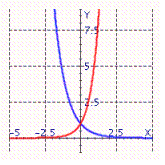
B)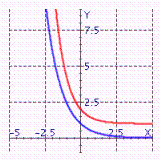
C)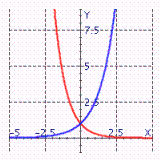
A)

B)

C)


Unlock Deck
Unlock for access to all 228 flashcards in this deck.
Unlock Deck
k this deck
26
Graph the exponential function.
A)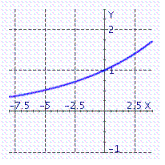
B)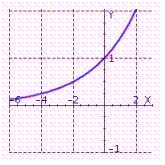
C)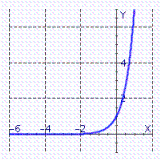
A)

B)

C)


Unlock Deck
Unlock for access to all 228 flashcards in this deck.
Unlock Deck
k this deck
27
Interest compounded annually is found using the formula

Unlock Deck
Unlock for access to all 228 flashcards in this deck.
Unlock Deck
k this deck
28
Solve the equation. 


Unlock Deck
Unlock for access to all 228 flashcards in this deck.
Unlock Deck
k this deck
29
Solve the equation. 


Unlock Deck
Unlock for access to all 228 flashcards in this deck.
Unlock Deck
k this deck
30
Solve the equation. 


Unlock Deck
Unlock for access to all 228 flashcards in this deck.
Unlock Deck
k this deck
31
Graph the exponential function.
A)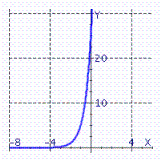
B)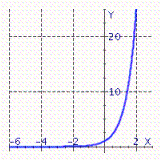
C)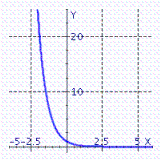
A)

B)

C)


Unlock Deck
Unlock for access to all 228 flashcards in this deck.
Unlock Deck
k this deck
32
A problem compounded quarterly is found by the formula .

Unlock Deck
Unlock for access to all 228 flashcards in this deck.
Unlock Deck
k this deck
33
Solve the equation. 


Unlock Deck
Unlock for access to all 228 flashcards in this deck.
Unlock Deck
k this deck
34
Solve the equation. 


Unlock Deck
Unlock for access to all 228 flashcards in this deck.
Unlock Deck
k this deck
35
Graph the exponential function.
A)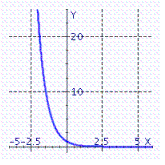
B)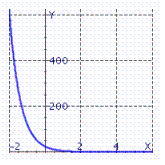
C)
A)

B)

C)


Unlock Deck
Unlock for access to all 228 flashcards in this deck.
Unlock Deck
k this deck
36
Solve the equation. 


Unlock Deck
Unlock for access to all 228 flashcards in this deck.
Unlock Deck
k this deck
37
Solve the equation.  Please enter your answer as a fraction.
Please enter your answer as a fraction.
 Please enter your answer as a fraction.
Please enter your answer as a fraction.
Unlock Deck
Unlock for access to all 228 flashcards in this deck.
Unlock Deck
k this deck
38
Solve the equation. 


Unlock Deck
Unlock for access to all 228 flashcards in this deck.
Unlock Deck
k this deck
39
Solve the equation. 


Unlock Deck
Unlock for access to all 228 flashcards in this deck.
Unlock Deck
k this deck
40
Solve the equation. 


Unlock Deck
Unlock for access to all 228 flashcards in this deck.
Unlock Deck
k this deck
41
Graph the exponential function.
A)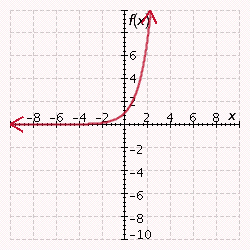
B)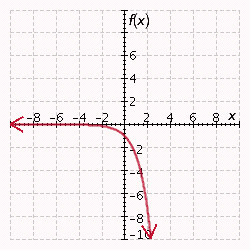
C)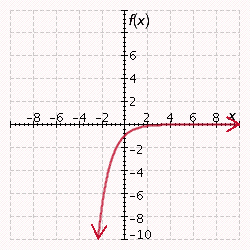
D)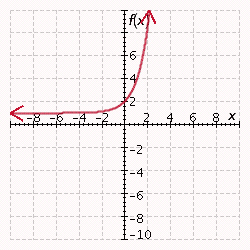
E)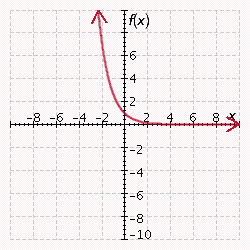
A)

B)

C)

D)

E)


Unlock Deck
Unlock for access to all 228 flashcards in this deck.
Unlock Deck
k this deck
42
The half-life of a radioactive substance is the amount of time that it takes for one-half of an initial amount of the substance to disappear as the result of decay.

Unlock Deck
Unlock for access to all 228 flashcards in this deck.
Unlock Deck
k this deck
43
In a certain balloon mortgage loan, the borrower pays the lender all of the principal and interest for the loan at the end of four years. What will be the payoff amount for a loan of $185,000 at 4% annual interest rate where the interest is compounded monthly?
A) $217,041.85
B) $217,041.70
C) $217,041.80
D) $217,041.65
E) $217,041.75
A) $217,041.85
B) $217,041.70
C) $217,041.80
D) $217,041.65
E) $217,041.75

Unlock Deck
Unlock for access to all 228 flashcards in this deck.
Unlock Deck
k this deck
44
If , then the formula is the law of decay model.

Unlock Deck
Unlock for access to all 228 flashcards in this deck.
Unlock Deck
k this deck
45
Suppose it is estimated that the value of a car depreciates 30% per year for the first 10 years. The equation yields the value ( A ) of a car after t years if the original price is P o . Find the value (to the nearest dollar) of $16,000.00 car after 2 years.
A) $5,227
B) $7,840
C) $18,032
D) $3,920
A) $5,227
B) $7,840
C) $18,032
D) $3,920

Unlock Deck
Unlock for access to all 228 flashcards in this deck.
Unlock Deck
k this deck
46
Use the formula to find the total amount of money accumulated at the end of the indicated time period by compounding continuously: $13,000 for 12 years at 9%. The choices are rounded to the nearest cent.
A) $38,280.83
B) $14,178.09
C) $103,358.25
D) $95,702.09
E) $15,312.33
A) $38,280.83
B) $14,178.09
C) $103,358.25
D) $95,702.09
E) $15,312.33

Unlock Deck
Unlock for access to all 228 flashcards in this deck.
Unlock Deck
k this deck
47
Use the formula to find the total amount of money accumulated at the end of the indicated time period for the following investments: $1,500 for 5 years at 4.5% compounded quarterly. The choices are rounded to the nearest cent.
A) $507.06
B) $6,941.67
C) $1,876.13
D) $750.45
E) $4,690.31
A) $507.06
B) $6,941.67
C) $1,876.13
D) $750.45
E) $4,690.31

Unlock Deck
Unlock for access to all 228 flashcards in this deck.
Unlock Deck
k this deck
48
Assuming that the rate of inflation is 4% per year, the equation P = P o (1.04) t yields the predicted price P , in t years, of an item that presently costs P o. Find the predicted price of a $0.95 soft drink in 9 years. The choices are rounded to the nearest cent.
A) $0.68
B) $1.35
C) $1.78
D) $2.20
A) $0.68
B) $1.35
C) $1.78
D) $2.20

Unlock Deck
Unlock for access to all 228 flashcards in this deck.
Unlock Deck
k this deck
49
Mark became overextended in his gambling debt and could not pay $750 he owed. The loan person said he could have five weeks to pay off the $750 at 8% interest per week compounded continuously. How much will Mark have to pay at the end of the five weeks? Please round the answer to the nearest hundredth.
A) $1,118.87
B) $1,119.07
C) $1,119.02
D) $1,118.97
E) $1,118.92
A) $1,118.87
B) $1,119.07
C) $1,119.02
D) $1,118.97
E) $1,118.92

Unlock Deck
Unlock for access to all 228 flashcards in this deck.
Unlock Deck
k this deck
50
Use the formula to find the total amount of money accumulated at the end of the indicated time period by compounding continuously: $6,750 for 11 years at 9.5%. The choices are rounded to the nearest cent.
A) $7,677.18
B) $19,192.94
C) $5,187.28
D) $71,013.88
E) $47,982.35
A) $7,677.18
B) $19,192.94
C) $5,187.28
D) $71,013.88
E) $47,982.35

Unlock Deck
Unlock for access to all 228 flashcards in this deck.
Unlock Deck
k this deck
51
Use the formulas or to find the amount for the investment. $10,800 for 5 years at 5% compounded continuously.
A) $13,867.40
B) $13,867.47
C) $13,867.54
D) $13,867.26
E) $13,867.33
A) $13,867.40
B) $13,867.47
C) $13,867.54
D) $13,867.26
E) $13,867.33

Unlock Deck
Unlock for access to all 228 flashcards in this deck.
Unlock Deck
k this deck
52
Rueben has a finance plan with the furniture store where the $4,770 he spent accrues finance charges at an annual interest rate of 9.3% compounded monthly for 4 years before he starts to make payments. What will be the balance on the account when he begins making payments?
A) $6,909.63
B) $6,909.72
C) $6,909.60
D) $6,909.69
E) $6,909.66
A) $6,909.63
B) $6,909.72
C) $6,909.60
D) $6,909.69
E) $6,909.66

Unlock Deck
Unlock for access to all 228 flashcards in this deck.
Unlock Deck
k this deck
53
Graph the exponential function.
A)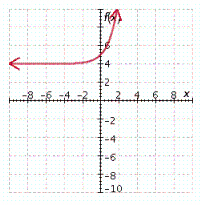
B)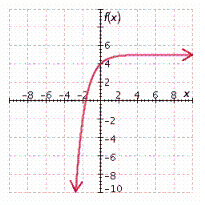
C)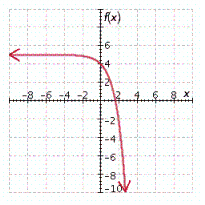
D)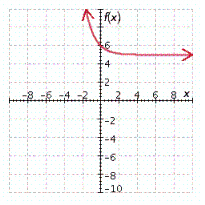
E)
A)

B)

C)

D)

E)


Unlock Deck
Unlock for access to all 228 flashcards in this deck.
Unlock Deck
k this deck
54
Use the formula to find the amount for the investment. $2,600 for 6 years at 3% compounded quarterly.
A) $3,110.68
B) $3,110.63
C) $3,110.53
D) $3,110.48
E) $3,110.58
A) $3,110.68
B) $3,110.63
C) $3,110.53
D) $3,110.48
E) $3,110.58

Unlock Deck
Unlock for access to all 228 flashcards in this deck.
Unlock Deck
k this deck
55
Graph the exponential function.
A)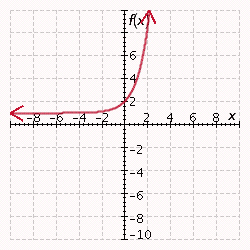
B)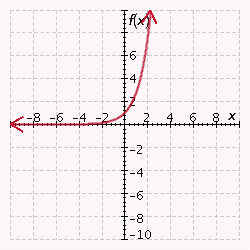
C)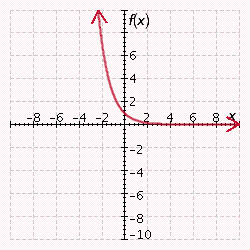
D)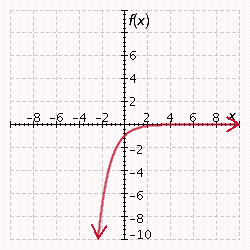
E)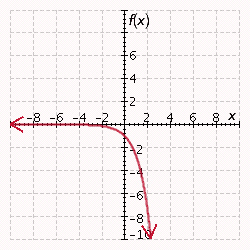
A)

B)

C)

D)

E)


Unlock Deck
Unlock for access to all 228 flashcards in this deck.
Unlock Deck
k this deck
56
Suppose that in a certain culture, the equation Q ( t ) = 1,000 e 0.5 t expresses the number of bacteria present as a function of the time t , where t is expressed in hours. How many bacteria are present at the end of 2 hours? The choices are rounded to the nearest whole.
A) 2,718 bacteria
B) 1,812 bacteria
C) 1,599 bacteria
D) 4,077 bacteria
E) 4,621 bacteria
A) 2,718 bacteria
B) 1,812 bacteria
C) 1,599 bacteria
D) 4,077 bacteria
E) 4,621 bacteria

Unlock Deck
Unlock for access to all 228 flashcards in this deck.
Unlock Deck
k this deck
57
Use the formula to find the amount for the investment. $13,400 for 4 years at 1.5% compounded semiannually.
A) $14,225.48
B) $14,225.36
C) $14,225.60
D) $14,225.54
E) $14,225.42
A) $14,225.48
B) $14,225.36
C) $14,225.60
D) $14,225.54
E) $14,225.42

Unlock Deck
Unlock for access to all 228 flashcards in this deck.
Unlock Deck
k this deck
58
Use the formula to find the total amount of money accumulated at the end of the indicated time period by compounding continuously: $1,000 for 2 years at 2%. The choices are rounded to the nearest cent.
A) $693.87
B) $1,561.22
C) $2,810.19
D) $1,040.81
E) $385.49
A) $693.87
B) $1,561.22
C) $2,810.19
D) $1,040.81
E) $385.49

Unlock Deck
Unlock for access to all 228 flashcards in this deck.
Unlock Deck
k this deck
59
Use the formulas or to find the amount for the investment. $4,200 for 5 years at 5% compounded continuously.
A) $5,392.77
B) $5,392.84
C) $5,392.70
D) $5,392.63
E) $5,392.91
A) $5,392.77
B) $5,392.84
C) $5,392.70
D) $5,392.63
E) $5,392.91

Unlock Deck
Unlock for access to all 228 flashcards in this deck.
Unlock Deck
k this deck
60
Use the formula to find the total amount of money accumulated at the end of the indicated time period by compounding continuously: $4,600 for 6 years at 3%. The choices are rounded to the nearest cent.
A) $9,362.24
B) $3,671.47
C) $8,260.80
D) $5,507.20
E) $3,239.53
A) $9,362.24
B) $3,671.47
C) $8,260.80
D) $5,507.20
E) $3,239.53

Unlock Deck
Unlock for access to all 228 flashcards in this deck.
Unlock Deck
k this deck
61
True or false? The function below is one-to-one. f ( x ) = | x | + 1

Unlock Deck
Unlock for access to all 228 flashcards in this deck.
Unlock Deck
k this deck
62
True or false? The graph below represents a one-to-one function. 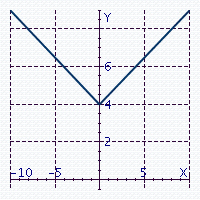


Unlock Deck
Unlock for access to all 228 flashcards in this deck.
Unlock Deck
k this deck
63
A function that is decreasing over its entire domain is a one-to-one function.

Unlock Deck
Unlock for access to all 228 flashcards in this deck.
Unlock Deck
k this deck
64
Use the formulas  or
or  to find the amount for the investments. $10,500 for 5 years at 4% compounded continuously. Please round the answer to the nearest hundredth.
to find the amount for the investments. $10,500 for 5 years at 4% compounded continuously. Please round the answer to the nearest hundredth.  $__________ $10,500 for 5 years at 4.5% compounded quarterly. Please round the answer to the nearest hundredth.
$__________ $10,500 for 5 years at 4.5% compounded quarterly. Please round the answer to the nearest hundredth.  $__________ Determine which investment amounts to more. __________
$__________ Determine which investment amounts to more. __________
 or
or  to find the amount for the investments. $10,500 for 5 years at 4% compounded continuously. Please round the answer to the nearest hundredth.
to find the amount for the investments. $10,500 for 5 years at 4% compounded continuously. Please round the answer to the nearest hundredth.  $__________ $10,500 for 5 years at 4.5% compounded quarterly. Please round the answer to the nearest hundredth.
$__________ $10,500 for 5 years at 4.5% compounded quarterly. Please round the answer to the nearest hundredth.  $__________ Determine which investment amounts to more. __________
$__________ Determine which investment amounts to more. __________
Unlock Deck
Unlock for access to all 228 flashcards in this deck.
Unlock Deck
k this deck
65
Use the formulas  or
or  to find the amount for the investments. $4,800 for 5 years at 4% compounded continuously. Please round the answer to the nearest cent.
to find the amount for the investments. $4,800 for 5 years at 4% compounded continuously. Please round the answer to the nearest cent.  $__________ $4,800 for 5 years at 4% compounded monthly. Please round the answer to the nearest cent.
$__________ $4,800 for 5 years at 4% compounded monthly. Please round the answer to the nearest cent.  $__________ Determine which investment amounts to more. __________
$__________ Determine which investment amounts to more. __________
 or
or  to find the amount for the investments. $4,800 for 5 years at 4% compounded continuously. Please round the answer to the nearest cent.
to find the amount for the investments. $4,800 for 5 years at 4% compounded continuously. Please round the answer to the nearest cent.  $__________ $4,800 for 5 years at 4% compounded monthly. Please round the answer to the nearest cent.
$__________ $4,800 for 5 years at 4% compounded monthly. Please round the answer to the nearest cent.  $__________ Determine which investment amounts to more. __________
$__________ Determine which investment amounts to more. __________
Unlock Deck
Unlock for access to all 228 flashcards in this deck.
Unlock Deck
k this deck
66
Use the formula  to find the amount for the investments. $2,200 for 5 years at 1.5% compounded annually. Please round the answer to the nearest hundredth.
to find the amount for the investments. $2,200 for 5 years at 1.5% compounded annually. Please round the answer to the nearest hundredth.  $__________ $2,200 for 5 years at 1% compounded quarterly. Please round the answer to the nearest hundredth.
$__________ $2,200 for 5 years at 1% compounded quarterly. Please round the answer to the nearest hundredth.  $__________ Determine which investment amounts to more. __________
$__________ Determine which investment amounts to more. __________
 to find the amount for the investments. $2,200 for 5 years at 1.5% compounded annually. Please round the answer to the nearest hundredth.
to find the amount for the investments. $2,200 for 5 years at 1.5% compounded annually. Please round the answer to the nearest hundredth.  $__________ $2,200 for 5 years at 1% compounded quarterly. Please round the answer to the nearest hundredth.
$__________ $2,200 for 5 years at 1% compounded quarterly. Please round the answer to the nearest hundredth.  $__________ Determine which investment amounts to more. __________
$__________ Determine which investment amounts to more. __________
Unlock Deck
Unlock for access to all 228 flashcards in this deck.
Unlock Deck
k this deck
67
Use the formula  to find the total amount of money accumulated at the end of the indicated time period by compounding continuously: $2,250 for 4 years at 3%. Please round the answer to the nearest cent. $__________
to find the total amount of money accumulated at the end of the indicated time period by compounding continuously: $2,250 for 4 years at 3%. Please round the answer to the nearest cent. $__________
 to find the total amount of money accumulated at the end of the indicated time period by compounding continuously: $2,250 for 4 years at 3%. Please round the answer to the nearest cent. $__________
to find the total amount of money accumulated at the end of the indicated time period by compounding continuously: $2,250 for 4 years at 3%. Please round the answer to the nearest cent. $__________
Unlock Deck
Unlock for access to all 228 flashcards in this deck.
Unlock Deck
k this deck
68
Use the formula  to find the amount for the investments. $13,600 for 5 years at 4.5% compounded semiannually. Please round the answer to the nearest cent.
to find the amount for the investments. $13,600 for 5 years at 4.5% compounded semiannually. Please round the answer to the nearest cent.  $__________ $13,600 for 5 years at 4% compounded monthly. Please round the answer to the nearest cent.
$__________ $13,600 for 5 years at 4% compounded monthly. Please round the answer to the nearest cent.  $__________ Determine which investment amounts to more. __________
$__________ Determine which investment amounts to more. __________
 to find the amount for the investments. $13,600 for 5 years at 4.5% compounded semiannually. Please round the answer to the nearest cent.
to find the amount for the investments. $13,600 for 5 years at 4.5% compounded semiannually. Please round the answer to the nearest cent.  $__________ $13,600 for 5 years at 4% compounded monthly. Please round the answer to the nearest cent.
$__________ $13,600 for 5 years at 4% compounded monthly. Please round the answer to the nearest cent.  $__________ Determine which investment amounts to more. __________
$__________ Determine which investment amounts to more. __________
Unlock Deck
Unlock for access to all 228 flashcards in this deck.
Unlock Deck
k this deck
69
True or false? The graph below represents a one-to-one function. 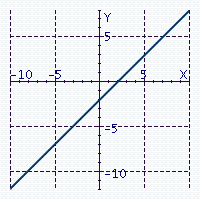


Unlock Deck
Unlock for access to all 228 flashcards in this deck.
Unlock Deck
k this deck
70
Use the formula  to find the total amount of money accumulated at the end of the indicated time period for the following investment: $3,000 for 3 years at 2.5% compounded quarterly. Please round the answer to the nearest cent. $__________
to find the total amount of money accumulated at the end of the indicated time period for the following investment: $3,000 for 3 years at 2.5% compounded quarterly. Please round the answer to the nearest cent. $__________
 to find the total amount of money accumulated at the end of the indicated time period for the following investment: $3,000 for 3 years at 2.5% compounded quarterly. Please round the answer to the nearest cent. $__________
to find the total amount of money accumulated at the end of the indicated time period for the following investment: $3,000 for 3 years at 2.5% compounded quarterly. Please round the answer to the nearest cent. $__________
Unlock Deck
Unlock for access to all 228 flashcards in this deck.
Unlock Deck
k this deck
71
True or false? The function below is one-to-one. f ( x ) = 5 x + 3

Unlock Deck
Unlock for access to all 228 flashcards in this deck.
Unlock Deck
k this deck
72
Use the formula  to find the total amount of money accumulated at the end of the indicated time period by compounding continuously: $2,000 for 3 years at 4%. Please round the answer to the nearest cent. $__________
to find the total amount of money accumulated at the end of the indicated time period by compounding continuously: $2,000 for 3 years at 4%. Please round the answer to the nearest cent. $__________
 to find the total amount of money accumulated at the end of the indicated time period by compounding continuously: $2,000 for 3 years at 4%. Please round the answer to the nearest cent. $__________
to find the total amount of money accumulated at the end of the indicated time period by compounding continuously: $2,000 for 3 years at 4%. Please round the answer to the nearest cent. $__________
Unlock Deck
Unlock for access to all 228 flashcards in this deck.
Unlock Deck
k this deck
73
True or false? The function below is one-to-one. f ( x ) = x 7

Unlock Deck
Unlock for access to all 228 flashcards in this deck.
Unlock Deck
k this deck
74
True or false? The function below is one-to-one function. f ( x ) = x 8

Unlock Deck
Unlock for access to all 228 flashcards in this deck.
Unlock Deck
k this deck
75
Use the formula  to find the total amount of money accumulated at the end of the indicated time period by compounding continuously: $7,250 for 12 years at 6.5%. Please round the answer to the nearest cent. $__________
to find the total amount of money accumulated at the end of the indicated time period by compounding continuously: $7,250 for 12 years at 6.5%. Please round the answer to the nearest cent. $__________
 to find the total amount of money accumulated at the end of the indicated time period by compounding continuously: $7,250 for 12 years at 6.5%. Please round the answer to the nearest cent. $__________
to find the total amount of money accumulated at the end of the indicated time period by compounding continuously: $7,250 for 12 years at 6.5%. Please round the answer to the nearest cent. $__________
Unlock Deck
Unlock for access to all 228 flashcards in this deck.
Unlock Deck
k this deck
76
A function that has exactly one value of x associated with each value of is a one-to-one function.

Unlock Deck
Unlock for access to all 228 flashcards in this deck.
Unlock Deck
k this deck
77
Mark became overextended in his gambling debt and could not pay $400 he owed. The loan person said he could have three weeks to pay off the $400 at 6% interest per week compounded continuously. How much will Mark have to pay at the end of the three weeks? Please round the answer to the nearest hundredth. $__________

Unlock Deck
Unlock for access to all 228 flashcards in this deck.
Unlock Deck
k this deck
78
Use the formula  to find the total amount of money accumulated at the end of the indicated time period by compounding continuously: $13,000 for 8 years at 6.25%. Please round the answer to the nearest cent. $__________
to find the total amount of money accumulated at the end of the indicated time period by compounding continuously: $13,000 for 8 years at 6.25%. Please round the answer to the nearest cent. $__________
 to find the total amount of money accumulated at the end of the indicated time period by compounding continuously: $13,000 for 8 years at 6.25%. Please round the answer to the nearest cent. $__________
to find the total amount of money accumulated at the end of the indicated time period by compounding continuously: $13,000 for 8 years at 6.25%. Please round the answer to the nearest cent. $__________
Unlock Deck
Unlock for access to all 228 flashcards in this deck.
Unlock Deck
k this deck
79
Rueben has a finance plan with the furniture store where the $4,990 he spent accrues finance charges at an annual interest rate of 10.3% compounded monthly for 4 years before he starts to make payments. What will be the balance on the account at the he must begin paying off the balance? Please round the answer to the nearest hundredth. $__________

Unlock Deck
Unlock for access to all 228 flashcards in this deck.
Unlock Deck
k this deck
80
In a certain balloon mortgage loan, the borrower pays the lender all of the principal and interest for the loan at the end of three years. What will be the payoff amount for a loan of $195,000 at 4% annual interest rate where the interest is compounded monthly? Please round the answer to the nearest hundredth. $__________

Unlock Deck
Unlock for access to all 228 flashcards in this deck.
Unlock Deck
k this deck



